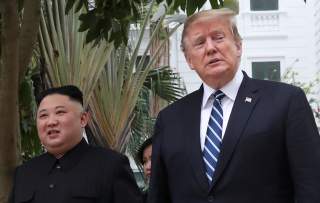Why Trump Dismissed North Korea's Missile Tests
Mutual talks and escalation management matter more than the flexing of the missiles.
Shunning the advice of aides and tossing the script aside is normal for President Donald Trump. He ad-libs as frequently as a bird chirps. Trump has always been supremely confident (rightly or wrongly) about his self-promotional talents; he is his own spokesman, lawyer, and negotiator.
So it should come as no surprise that Trump, standing on a stage with Japanese Prime Minister Shinzo Abe in Tokyo, said pretty much the exact opposite of what his own national security adviser told reporters days prior regarding North Korean leader Kim Jong-un’s ballistic missile tests earlier this month. Whereas John Bolton faulted Pyongyang for committing an obvious violation of UN Security Council resolutions with the latest test, Trump waved it away like former White House Chief of Staff Reince Priebus used to wave away flies in the Oval Office. Asked whether he was personally offended by North Korea’s missile launches, Trump replied, “No, I’m not,” before adding “My people think it could have been a violation. I view it differently.”
What is really going on here? Is this another case of Trump being Trump? Is the president operating on a different universe than his advisers, making him appear “increasingly alone on North Korea” as a Politico headline stated?
All of this may be true. But there’s something else that better explains Trump’s behavior—he is deathly concerned about his personal diplomacy with Kim falling apart completely.
Direct talks between the United States and North Korea have become the new normal, but it was only a short time ago when the very prospect of Washington reaching out to the most brutal regime in the world was labeled as grotesque and unseemly. Politically, it was a lot easier for a lawmaker or president to just pile on the sanctions and trash Kim as a pot-belly tyrant with a strange haircut than actually engaging with him and trying to solve the nuclear problem. It’s hard to overstate just how explosive Trump’s decision to talk with Kim was in Singapore last June. The foreign policy establishment in Washington viewed it as capitulation. Democrats saw it as another example of a president flailing around wildly, more interested in a photo op and showmanship. Even some of his fellow Republicans were unable to believe what they were seeing and hearing. Besides, Defense Secretary Jim Mattis and National Security Adviser H. R. McMaster didn’t think a summit was a good idea either.
Trump would have none of it. It was in many ways a leap of faith, the most unconventional of moves from the most unconventional president the country has ever had.
It wasn’t difficult to see why the president would want to shake things up. The “strategic patience” policy of the prior administration, which was essentially a fancy way of saying “let’s just wait until North Korea comes to the table,” was an unmitigated failure.
The talks have obviously not gone as well or as quickly as the president would have liked. Despite Kim’s moratorium on nuclear and intercontinental ballistic missile tests, and considerable movement on military de-escalation and confidence-building measures between North and South Korea, Kim has shown no hint that he is willing to trade away his nuclear weapons for economic sanctions relief and an end to diplomatic isolation. (Meanwhile, the inter-Korean talks have hit a road bump, with North Korean officials refusing to pick up the phone when Seoul dials.)
But why would Kim want to give up his nuclear deterrence? In Kim’s eyes, short-term denuclearization is lunacy—akin to walking in the bear-infested wilderness without a sharp stick for protection. The circumstances surrounding Muammar el-Qaddafi demise are never far from Kim Jong-un’s mind. Qaddafi, too, was promised normalization with the West in return for sending his weapons of mass destruction programs to Oak Ridge, Tennessee. About eight years later, he was executed by his enemies.
If Trump didn’t understand how monumentally hard it would be to accomplish North Korea’s denuclearization, then he certainly does now. Of course, when the objective is so out of reach, talks will inevitably grind to a halt. The president has two choices: he can continue pushing the impossible, or he can dramatically change his strategy and strike the type of arrangements that may introduce more predictability onto the Korean Peninsula (even if Pyongyang continues to possess a nuclear weapons program for the medium-term).
Right now, however, Trump is doing everything he can to keep the channel with Kim alive. He doesn’t want to do anything or say anything that would push Kim over the edge and convince him to walk away completely. If that means dismissing what is a clear Security Council violation, so be it. He is too personally and politically invested in the process to let it die.
Daniel R. DePetris is a columnist for the Washington Examiner and the American Conservative and a frequent contributor to the National Interest.
Image: Reuters

